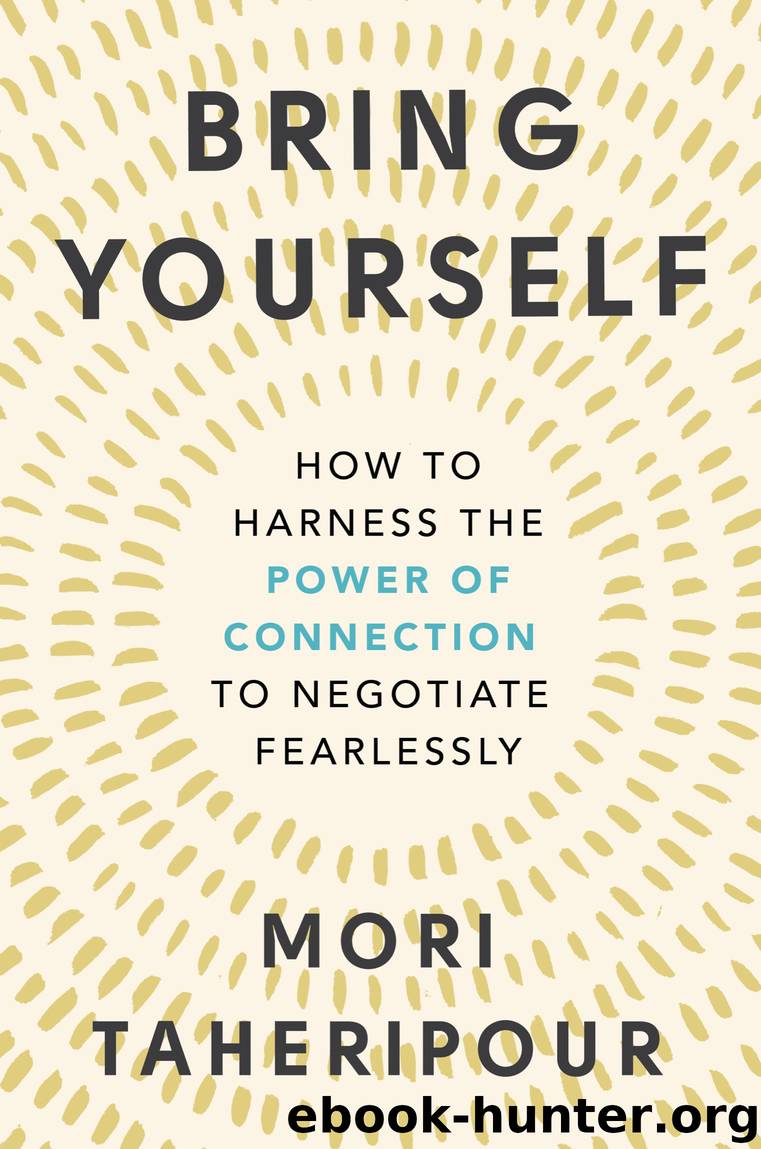Bring Yourself by Mori Taheripour

Author:Mori Taheripour [Taheripour, Mori]
Language: eng
Format: epub
Publisher: Penguin Publishing Group
Published: 2020-03-24T00:00:00+00:00
Empathy has a bad rap
Many feel that having too much empathy is a weakness—not an asset—in a negotiation. They argue that you have to be emotionless to be effective; otherwise you are apt to concede too much. My students constantly apologize for their empathy, thinking it gets in the way of effective negotiation. But this is dead wrong. Empathetic people are, in fact, some of the best negotiators out there. Empathetic people are the most able to put themselves in their counterparts’ position and assess what they might want. Empathetic people are the ultimate information gatherers.
Empathetic negotiators run into problems only when they get so involved in the feelings of others that they cross over to taking on those challenges as their own. As Dom put it, “Empathy is working with others the best you can. Stupidity is giving away the house.” I wouldn’t call it stupid, but we do get into trouble when we can’t separate ourselves emotionally. This is what Emily, the pleaser who was buying a used car in Chapter 2, struggled with when she thought, “Oh, this poor car salesman is going to be late for dinner with his girlfriend and I can’t let that happen.” These empathetic people aren’t able to draw a line, and their decision making is impacted to their detriment. Deeply intertwined with this tendency is that they are not turning their empathy on themselves. These negotiators are focused on other people’s needs and wants and mistakenly think they can’t also focus on their own, that the two are mutually exclusive. What they don’t understand is that without taking care of themselves, too, they can’t be effective.
I learned this lesson the hard way with my health care consulting practice. When we had to lay people off, it was awful. I empathized with their disappointment and lost many nights of sleep worrying about them. Although I firmly believe this empathy was essential to the collaborative culture that I was trying to establish, I took it too far. I made it my responsibility to fix it by delaying the downsizing, putting unnecessary strain on our already dwindling budget. I took on their strain and internalized it.
Many leaders find themselves walking the same line I walked, struggling with the same question I did: How do I care about my employees without caring so much that it affects my ability to run the business? My student Saudia is one such leader. She founded a cleaning service, and most of her employees come from the same demographic as her mother and grandmother: single moms, immigrants, not formally educated, economically vulnerable. Saudia feels a great sense of responsibility to these employees. She remembers how the first time she gave out paychecks, one of her employees literally ran to the Western Union to send money to her mother in Columbia, who would now be able to afford surgery. The benefits and consequences of Saudia’s business success feel very personal because they are.
When Saudia realized she had a seriously underperforming employee, she was in a hard spot and went through a grueling negotiation within herself.
Download
This site does not store any files on its server. We only index and link to content provided by other sites. Please contact the content providers to delete copyright contents if any and email us, we'll remove relevant links or contents immediately.
| Ethics | Etiquette |
| Fashion & Image | Health & Stress |
| Motivation & Self-Improvement | Work Life Balance |
| Workplace Culture |
Tools of Titans by Timothy Ferriss(8369)
Change Your Questions, Change Your Life by Marilee Adams(7762)
Deep Work by Cal Newport(7068)
Playing to Win_ How Strategy Really Works by A.G. Lafley & Roger L. Martin(6254)
Man-made Catastrophes and Risk Information Concealment by Dmitry Chernov & Didier Sornette(6007)
Big Magic: Creative Living Beyond Fear by Elizabeth Gilbert(5756)
Digital Minimalism by Cal Newport;(5750)
Ego Is the Enemy by Ryan Holiday(5417)
The Slight Edge by Jeff Olson(5410)
The Motivation Myth by Jeff Haden(5206)
The Laws of Human Nature by Robert Greene(5179)
Stone's Rules by Roger Stone(5081)
Tuesdays with Morrie by Mitch Albom(4774)
Eat That Frog! by Brian Tracy(4526)
Rising Strong by Brene Brown(4451)
Skin in the Game by Nassim Nicholas Taleb(4240)
The Money Culture by Michael Lewis(4198)
Bullshit Jobs by David Graeber(4179)
Skin in the Game: Hidden Asymmetries in Daily Life by Nassim Nicholas Taleb(3993)
